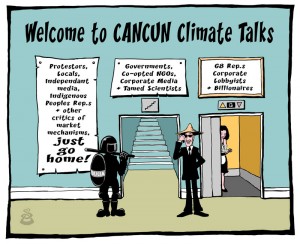Dickinson to Durban » Summer Reading Responses » High Expectations for Durban
High Expectations for Durban
The continuous challenge of global climate change involves a collective and comprehensive effort on an international level to reach significant decisions that could potentially address the dangerous effects of global warming. The UNFCCC annually performs an attempt to reach agreements over climate regulation. The Conference of the Parties (COP) comes together every year to promote negotiation, cooperation, and ultimately, progress against the effects of climate change. Most recently, COP-16 in Cancun, Mexico reached a number of agreements and attempts for regulation.
Overall, the conference in Cancun was relatively successful in maintaining a mutual, collective effort toward reducing emissions, promoting sustainable development, and concurring with a common goal of keeping the average global temperature rise below 2° Celsius (http://cancun.unfccc.int/cancun-agreements/significance-of-the-key-agreements-reached-at-cancun/#c45). The many objectives for COP-16 included a wide range of goals:
- Establish clear objectives for reducing human-generated greenhouse gas emissions over time the keep the global average temperature rise below two degrees
- Encourage the participation of all countries in reducing these emissions, in accordance with each country’s different responsibilities and capabilities to do so
- Ensure the international transparency of the actions which are taken by countries and ensure that global progress towards the long-term goal is reviewed in a timely way
- Mobilize the development and transfer of clean technology to boost efforts to address climate change, getting it to the right place at the right time and for the best effect
- Mobilize and provide scaled-up funds in the short and long term to enable developing countries to take greater and effective action
- Assist the particularly vulnerable people in the world to adapt to the inevitable impacts of climate change
- Protect the world’s forests, which are a major repository of carbon
- Build up global capacity, especially in developing countries, to meet the overall challenge
The majority of these objectives from Cancun are reasonable, realistic, but also modest. The World Resources Institute (WRI) argues that such agreements were made possible due to low expectations coming into the conference. These expectations allowed delegates to feel less pressured and thus, more willing to make agreements. It is also argued that the transparency of the Mexican government allowed for a concrete trust factor, which ultimately led to more settlements. The fact that developed nations, such as the United States and China, were more willing to cooperate also encouraged a togetherness and in the end, agreement.
 Donald Brown, an associate professor at Penn State University disputes that the Cancun meeting was a success; he instead suggests that the agreements made were unethical and were failed attempts to prevent the dangerous effects of climate change. The ethics of supporting developing countries throughout this process brings complicated issues to the table. Funding development projects and preventing developing countries from being hit with the wrath of treacherous climate change effects is something that becomes an ethics issue. For example, when we participated in the World Climate simulation, funding developing countries was a menace, as developed countries believed that funding should first go to the rapidly developing countries. Brown makes a valid point that such agreements are ethical issues.
Donald Brown, an associate professor at Penn State University disputes that the Cancun meeting was a success; he instead suggests that the agreements made were unethical and were failed attempts to prevent the dangerous effects of climate change. The ethics of supporting developing countries throughout this process brings complicated issues to the table. Funding development projects and preventing developing countries from being hit with the wrath of treacherous climate change effects is something that becomes an ethics issue. For example, when we participated in the World Climate simulation, funding developing countries was a menace, as developed countries believed that funding should first go to the rapidly developing countries. Brown makes a valid point that such agreements are ethical issues.
Whether the glass is half-empty or half-full, the agreements made in Cancun were small footsteps in the direction that need to be taken. There are high hopes for the COP-17 Durban meeting.
Works Cited:
Brown, 2010. “An Ethical Analysis of the Cancun Climate Negotiations Outcome.” http://rockblogs.psu.edu/climate/2010/12/an-ethical-analysis-of-the-cancun-climate-negotiations-outcome.html
Morgan, 2010. “Reflections on the Cancun Agreements.”http://www.wri.org/stories/2010/12/reflections-cancun-agreements.
UNFCCC, 2011. The Cancun Agreements. http://cancun.unfccc.int/cancun-agreements/main-objectives-of-the-agreements/#c33.
Filed under: Summer Reading Responses · Tags: COP16, COP17, Donald Brown, Jennifer Morgan, Maggie Rees, UNFCCC








Maggie, interesting response. Do you think the high expectations going into Durban could have an effect on the overall negotiations?